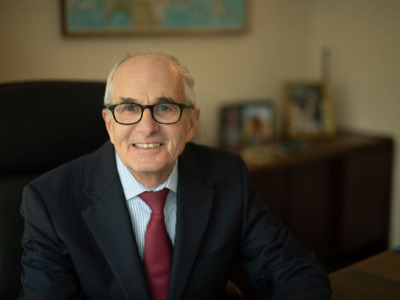The theme of the World Food Prize this year is “The Next Borlaug Century: Biotechnology, Sustainability and Climate Volatility" and for very good reasons. Dr. Borlaug’s contribution in this next century may be even more important than his contribution was in the last century….if that’s possible.
The World Food Prize this year is to be shared by three distinguished plant scientists, Marc Van Montagu, Mary-Dell Chilton and Robert Fraley. In announcing the winners of the Prize at the State Department, Secretary of State John Kerry said “I join in congratulating each of the winners for their pioneering efforts and their tremendous contributions to biotechnology and the fight against hunger and malnutrition.”
Dr. Norman Ernest Borlaug, born in 1914, was an agronomist and true international hero. He won the Nobel Peace Prize, the Presidential Medal of Freedom and the Congressional Gold Medal. To this day, Dr. Borlaug remains the only person to ever receive the Nobel Peace Prize for contributions to agriculture.
After winning the Nobel Peace Prize in 1970, Dr. Borlaug, known as “The Father of the Green Revolution” established the World Food Prize to focus attention on agriculture and global food security. Borlaug died in 2009.
Like many great men and women, Borlaug built upon the work of his predecessors and colleagues. One such person was Edgar S. McFadden (1891 – 1956) who made breakthroughs in wheat breeding in South Dakota and in Texas. McFadden (widely known as “Mac”) grew up on a farm where he observed the presence of stem rust and its developmental stages. By 1913 he was conducting an aggressive breeding program in wheat, oats, corn and barley. At the age of 34, Mac accomplished what became the center piece of his career, the development of “Hope Wheat” a spring wheat variety that was immune to stem rust. “Hope” was the first succesfully cross between common wheat and an ancestrial wheat species.
After graduating with a B.S. degree in Agriculture from South Dakota State College in 1918, Mac began a career with the USDA Bureau of Plant Industry. He worked for a period of time at the University of Minnesota St. Paul campus while Norman Borlaug was also there studying forestry. As fate would have it, both Mac and Borlaug went on to collaborate on Rockefeller Foundation’s wheat improvement program in Mexico from 1944 to 1955. The picture below was taken in 1951.

From left to right: B.B. Bayles, USDA-ARS; Leo Prochazka, wheat farmer;Edgar McFadden; Dr. Norman E. Borlaug
South Dakota State University has now established Edgar S. McFadden Endowment for Wheat Improvement, according to Dr. David Chicoine, “in order to recognize the important contribution of Edgar McFadden and to continue the Borlaug-McFadden legacy. We are continuing research on new varieties of wheat. Our spring wheat and winter wheat breeding program now releases 1-3 new varieties each year and our goal is to expand the program further.”
The 12th century scholar Bernard of Chartres said; "We stand on the shoulder of giants." Over the centuries this wonderful quote has been widely used to humbly acknowledge the creative work of those who have gone before us. The relationship between Edger McFadden and Norman Borlaug is a beautiful example of this relationship, not only between the two of them, but for the thousands of scientists working across the globe.
Marc Van Montagu, Mary Dell-Chilton and Robert Fraley are standing on the shoulders of Dr. Norman Borlaug, Edgar McFadden and scientist who have a passionate desire to achieve global food security.
While Dr. Borlaug was first and foremost a brilliant agronomist, he was also an astute political scientist. During our last visit together at the World Food Prize in Des Moines he instructed: “Marshall, push the politicians to the wall.” Scientists can show us how to achieve global food security but only if political leaders around the world provide the right policy environment.
The comments of Secretary Kerry in announcing the Prize will be critical in helping to chart the course for the Next Borlaug Century. As the Secretary said “It is simply true that biotechnology has dramatically increased crop yields. It has dramatically decreased loss due to pests and disease, and it allows us to feed more people without converting tropical forests or fragile lands in order to do so. And these crops will allow farmers to reduce their use of pesticides…..So we save money and we save the environment and we save lives. It is a virtuous circle.”
Last month, before the G8 meeting in Ireland, British Prime Minister David Cameron raised eyebrows by saying “we need to ensure a pro-science culture.” He then continued: “I think there are a number of subjects we need to take on. I think it is time to look again at the whole issue for GM food. We need to be open to arguments from science.”
Amen. Dr. Borlaug must be looking down and smiling.
About the Author: Marshall Matz served as Counsel to the Senate Agriculture Committee and founded Friends of the World Food Program—USA. He specializes on agriculture policy at OFW Law. To contact Marshall: mmatz@ofwlaw.com

